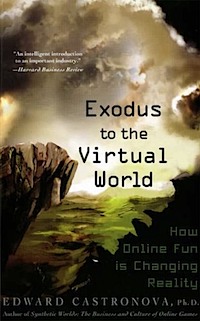Martin Weller provides evidence that technology really will change the educational environment. So why is his evidence more compelling compared to the advent of the radio, the television, or indeed the personal-computer? I think it has to do with the ability of the interconnected world being able to vote with their feet in a virtual sense. That is universities (to focus say on tertiary education), no longer are the sole repository of information, academic expertise, or scholarly information. The advent of Google, the emergence of easy to set up, cheap and personalised social networks (eg MySpace & Facebook), allows today's and especially tomorrow's students to offer:
- Education in 'niche' areas. Want to study the minutia of actors who specialise in transgender roles (think Dustin Hoffman in Tootsie - ok that's given my age cohort away)? Not a problem, globally there's probably a sizeable class - who cares if they're scattered across the globe.
- A personalised learning space. Your learning environment is how you would like it to be because you designed it that way.
- A flexible easy to scale up system. Since there are marginal additional infrastructural costs to delivering a course for 20, 200 or 2000 students (storage space, bandwidth, additional tutors) online, this is an easy way to scale a course offering. Compared to a physical learning environment where larger lecture halls, more lecturers, tutors and admin staff are required; to say nothing of more accommodation for students that live out of town, more lavatories, dinning halls and support services.
Can we see any evidence of the 'quiet migration' that Weller alludes to? I think the answer is both 'yes' and 'no'.
'No', as much as students may prefer their freedom to pick and choose and personalise away, this is probably not the case for beginning students where they are so new to the tertiary institution that they do not know what they want to pick and choose or what kind of personalisation they want. An lecturing colleague of mine once said that she believed that the push to make most tuition available online for the 1st year studens and face to face for the final year students, was the wrong way around. Her argument was based on the fact that 1st year students have little conception of what it means to be at univesity and therefore do not know what they are doing at a basic learning level – essentially do not know how to learn at university. Final year students in contrast (should) have this skill and can therefore concentrate on the learning of the issue at hand – more appropriate for a final year student. Interestingly, I know that the big push for pushing the courses online fell very much in line with the thinking that Tara Brabazon (2001) was suggesting; it was a way to cut and save staff costs, rather than any educational benefit.
'Yes' the quiet migration maybe happening, because students are abandoning the centralised 'virtual learning environment' or VLE in favour of their own personalised learning environments.
References
Brabazon, T. (2001) Internet teaching and the administration of knowledge. Accessed on, 10th June, 2009, <http://131.193.153.231/www/issues/issue6_6/brabazon/index.html>.
Weller, M. (2009) Using learning environments as a metaphor for educational change. Forthcoming publication On the Horizon.
